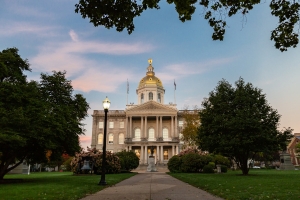For some bills, the legislative session is just beginning

While the House and Senate wrapped up their legislative session on June 24, close to 200 bills are still “retained in committee” in the House of Representatives. Committees will have a chance to work on these bills over the summer and fall, before the legislature reconvenes in January.
Sometimes committees retain legislation as a polite way to kill a bill or make way for an alternate proposal. Other bills retained in committee get significant work and emerge as flagship legislation the next year.
This article highlights some of the notable bills retained in committee this summer.
Marijuana legalization
There are two marijuana legalization bills retained in the House Criminal Justice and Public Safety Committee, ready for debate in the coming months. HB 237 would legalize and tax marijuana for adults over age 21. HB 629 would legalize possession of up to ¾ oz of marijuana for adults over age 21 and allow home-growing, but not sales. A third bill, HB 526, would lessen the penalties for personal possession of marijuana.
Marijuana legalization certainly faces an uphill battle so long as Gov. Sununu is in office. He opposes marijuana legalization, and it is unlikely that two-thirds of the House and Senate would support overriding his veto of a marijuana legalization bill. Still, with polls showing strong public support for marijuana legalization and all surrounding states allowing marijuana possession, there will be pressure on legislators to consider legalization in 2022.
Voting changes galore
There are over a dozen bills retained in the House Election Law Committee, covering everything from ID requirements for absentee ballots to post-election ballot inspections. The volume of bills in the Election Law Committee shows how focused some Republicans are on election security. In contrast, when asked about a 300-vote discrepancy between hand-counted and machine-counted ballots in Windham this year, Gov. Sununu said:
“A discrepancy of 300 votes out of over 800,000 cast does not constitute ‘massive election fraud.’ In fact, it is proof that New Hampshire’s voting process is the most reliable, safe, and secure in the country, and that we will ensure every last vote is accurately accounted for.”
(A forensic audit of the Windham ballots and voting machines later identified a problem with how the machines read folded ballots.)
While Gov. Sununu touts the security of New Hampshire’s elections, that doesn’t mean he would automatically veto any changes. This year’s budget process has shown that Sununu can be very flexible on his policy positions; he is poised to sign a budget that includes emergency power restrictions and other policies he once opposed.
Accommodations for pregnant and nursing employees
This year the Senate passed two bills that would require employers to accommodate pregnant and nursing employees. The House Commerce and Consumer Affairs Committee retained both of those bills, SB 68 and SB 69. The Senate pushed to get the bills over the finish line by adding them as an amendment to HB 610, but representatives refused that change, arguing that the bills needed more work in committee.
Proponents of SB 68 and SB 69 argue that women need this protection and support to return to work – especially in light of New Hampshire’s workforce shortage. Opponents argue that the Human Rights Commission already works to prevent discrimination against pregnant and lactating employees, and these bills could burden employers.
Gov. Sununu backed similar legislation in 2020, but that bill died during the COVID-19 legislative shutdown.
Dental coverage under Medicaid
This year House budget negotiators nixed a Senate plan to provide dental coverage under Medicaid, arguing that the House didn’t get enough time to examine the costs. HB 103 was a separate bill to add dental benefits to Medicaid; that bill was retained in committee and could be the vehicle to move the plan forward in 2022.
Supporters argue that covering dental care will ultimately lead to Medicaid savings, since poor oral health is linked to diabetes, heart disease, and other expensive health conditions. Opponents argue that the costs of dental coverage are still unclear.
Gov. Sununu vetoed a similar bill in 2020 over a potential $11 million price tag, but says he supports the concept of adding dental coverage to Medicaid.
Redistricting
New Hampshire redraws its electoral districts based on U.S. Census data, but due to COVID-19, that data was delayed this year. Legislators won’t get detailed population data until September, so all of the House redistricting bills are retained in committee.
New Hampshire GOP Chairman Steve Stepanek said Republicans will redraw the districts to favor their party, particularly in the 1st Congressional District. With Republicans controlling the state House, Senate, and governor’s office, they certainly have the power to group towns in their favor.
Redistricting bills still have to go through the same legislative process as other bills, so expect a lot of public comment and debate starting this fall.











Comments
Login or register to post comments